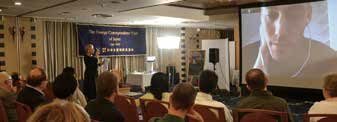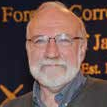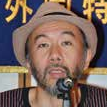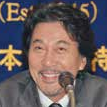Issue:

Kabukicho Love Hotel (above) attracted a big audience for the screening, and a big media interest for the first appearance of its star post marriage to Oscar nominated actress Rinko Kikuchi.
Faces of film
Atsuko Ochiai, producer/editor of Walking with My Mother; John Junkerman, director of Okinawa: The Afterburn; Shinya Tsukamoto, director of Fires on the Plain; actor Koji Yakusho, star of The Emperor in August.
2015 was a stellar year for the FCCJ Film Committee, with an impressive lineup, provocative Q&A sessions and appreciative audiences.
The Film Committee (FC) hosted 18 sneak preview screenings last year 12 narrative films and six documentaries, each followed by a Q&A session with the filmmaking team attracting an audience of over 1,500. The extensive coverage of our Q&As helped raised the profile of several independent features, and many of the titles became box office draws in Japan. Many also went on to receive international attention, appear on Top Ten lists and reap awards. Some even prompted valuable public dialogue.
The big story in 2015 was the 70th anniversary of the end of World War II, and the FC lineup included five directly related works. We also highlighted films about such torn from the headlines issues as nuclear energy (Masako Sakata’s Journey Without End) and globalization’s impact on rural populations (Pio d’Emilia’s Nu Guo: In the Name of the Mother).
But sometimes external forces, and not necessarily the film itself, drew the press to an FC event. Such was the case with our first screening of the year, Ryuichi Hiroki’s Kabukicho Love Hotel (Sayonara Kabukicho), when dozens of Japanese journalists crammed into the packed screening room for the Q&A. Surprisingly, they weren’t there for former AKB48 queen Atsuko Maeda; this was about the film’s other star, Shota Sometani, making his first public appearance since marrying Oscar nominated actress Rinko Kikuchi. “We don’t have any children yet,” the actor said, “but we hope to in the future, and I’ll work hard at being the patriarch.”
In April, we screened Walking with My Mother (Houyou), a corrosive portrait of aging, loss and unexpected recovery, echoing many of the healthcare challenges facing Japan. Katsumi Sakaguchi filmed his own ailing mother for four years to create the film. “I saw [her] reflection in my camera lens, and she looked so fragile, sitting by the window,” he recalled. “I had mixed feelings, because I loved her, but [having to take care of her] was stripping away my freedom… The distance of having to focus saved me.” The documentary went on to open Germany’s Nippon Connection festival, to play in theaters across Japan for half a year, and to win the prestigious BunkaCho Award for Best Documentary.
Oscar nominated documentarian John Junkerman headlined our June screening of Okinawa: The Afterburn (Okinawa: Urizun no Ame), his groundbreaking illumination of the island’s continued occupation, violations of human and civil rights, and resistance efforts. The director lived on Okinawa in the mid 1970s, and was struck by “the pervasive and abiding rejection of war among the Okinawa people, and by how incongruous and violent the American military presence on the island was… I felt a responsibility to make a film that would penetrate, if only in a small way, [America’s] shroud of apathy.” The documentary provides essential historical context for the ongoing U.S. Japan flashpoint, and later earned Junkerman the two most important recognitions in Japan for a nonfiction work: Best Documentary awards from Kinema Junpo and the Mainichi Film Awards.

Joshua Oppenheimer joins us via Skype for a discussion after the screening of the Oscar nominated The Look of Silence.
Another Oscar nominee, Joshua Oppenheimer, Skyped into our Q&A session after The Look of Silence screening in July. This follow up to his 2013 juggernaut The Act of Killing views the Indonesian genocide of the 1960s from the victims’, rather than the perpetrators’, standpoint. “The first film made it impossible for people to continue not talking about the regime of corruption, fear and thuggery that the perpetrators had built,” Oppenheimer said. “The second film makes it impossible to continue to ignore the abyss [that] divides people… You can’t solve a problem that you can’t even talk about.” Oppenheimer also stressed the importance of viewing the two films not as doors to some distant culture, but as mirrors for our own. The Look of Silence followed in the path of its companion work, winning close to 50 major Best Documentary awards and an Academy Award nomination.
The FC screened two very different perspectives of Japan in late summer. Fires on the Plain, Shinya Tsukamoto’s gripping adaptation of the 1951 anti war masterpiece Nobi, is more savagely brutal than the earlier version, but a fitting reinterpretation for our time. It is an intensely visceral reminder of the utter obscenity of war: kill or be killed, eat or be eaten. “In the original book, the author deals with cannibalism as a central issue,” said the director during the Q&A in July, “but the choice, the moral dilemma of whether or not to eat human flesh, is not a focus of this film… I realized [the soldiers in the Philippines] didn’t have any capacity to think about their actions. They were so pressed, so desperate, that they were unable to address this moral dilemma…. We have to do whatever we can to stop Japan’s slide toward militarization.” Tsukamoto’s film lit up the foreign and Japanese box offices, and he eventually received Mainichi Film Awards both for Best Director and Best Actor.
Masato Harada’s The Emperor in August (Nihon no Ichiban Nagai Hi) dramatizes the same source novel as the 1967 film Japan’s Longest Day, enhanced by new research and a laxer attitude toward depicting Emperor Hirohito. During the Q&A in early August, Harada noted, “At the time of the war, the emperor was considered the head of the house, the head of the family, and I feel this type of thinking was able to save Japan and end the war.” The film’s star, Koji Yakusho, added, “This is a film about how Japan ended the war. But it has a simple message that we can all understand: It is easy to start a war, but it is very, very difficult to end one.” Emperor was later nominated for more awards than any other Japanese film of 2015, including 11 Japan Academy Prizes. It won the Blue Ribbon Award for Best Film, and Masahiro Motoki, playing Emperor Hirohito, took home the Academy’s Best Supporting Actor trophy.
The FCCJ hosted the de facto Japan premiere ofMasao Adachi’s new film, Artist of Fasting (Danjiki Geinin), in September. Only his second work since being deported from Lebanon in 2000 following imprisonment for his Japanese Red Army activities, it proves that Adachi’s youthful instincts for provocation and transgression honed with cohorts Nagisa Oshima and Koji Wakamatsu have not dimmed. The director sets his story around a faster’s “performance” on a street corner, and punctuates it with avant-garde interludes of torture as well as archival footage of victims of aggression. Asked how he sees the position of the artist activist today, Adachi answered, “People say that history always repeats, but my feeling is that it will never be as bad as in the past. I believe that revolution and cinema are one and the same … and we still have a lot to do.”




Japan born Cellin Gluck returned to the FCCJ in December with the first ever biopic of the “Japanese Schindler,” Persona Non Grata (Sugihara Chiune). Sugihara was a diplomat who defied foreign ministry orders during the Holocaust and saved some 6,000 Jewish lives. The Q&A focused primarily on the timing of the film’s release vis-à-vis the refugee crisis in Europe. Asked how it might help pressure Japan into accepting more refugees, Gluck said, “I’m not in any position to lecture the Japanese government. But it’s not only the government… If this film will inspire [Japanese] to accept the opportunities [to embrace diversity], then I’ve accomplished what I would like to accomplish.” Gluck’s film was a year end hit and is just beginning its international rollout.
With our 2016 film series well under way, the FC will continue curating a selection of titles that are timely, compelling, entertaining, eye opening and even, on occasion, transformative.
Karen Severns is a writer, educator and filmmaker who chairs the FC. See her blog for more on the FC screenings: www.fccj.or.jp/events- calendar/film-screenings/movie-committee-blog.html

